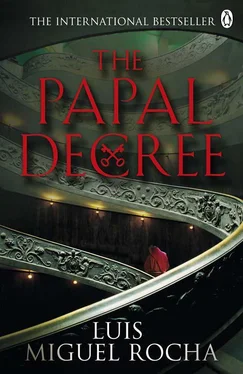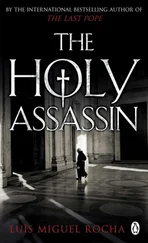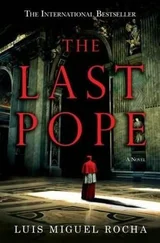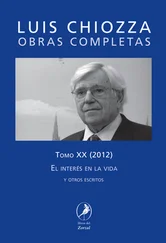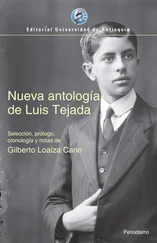Luis Rocha - Papal decree
Здесь есть возможность читать онлайн «Luis Rocha - Papal decree» весь текст электронной книги совершенно бесплатно (целиком полную версию без сокращений). В некоторых случаях можно слушать аудио, скачать через торрент в формате fb2 и присутствует краткое содержание. Жанр: Триллер, на английском языке. Описание произведения, (предисловие) а так же отзывы посетителей доступны на портале библиотеки ЛибКат.
- Название:Papal decree
- Автор:
- Жанр:
- Год:неизвестен
- ISBN:нет данных
- Рейтинг книги:4 / 5. Голосов: 1
-
Избранное:Добавить в избранное
- Отзывы:
-
Ваша оценка:
- 80
- 1
- 2
- 3
- 4
- 5
Papal decree: краткое содержание, описание и аннотация
Предлагаем к чтению аннотацию, описание, краткое содержание или предисловие (зависит от того, что написал сам автор книги «Papal decree»). Если вы не нашли необходимую информацию о книге — напишите в комментариях, мы постараемся отыскать её.
Papal decree — читать онлайн бесплатно полную книгу (весь текст) целиком
Ниже представлен текст книги, разбитый по страницам. Система сохранения места последней прочитанной страницы, позволяет с удобством читать онлайн бесплатно книгу «Papal decree», без необходимости каждый раз заново искать на чём Вы остановились. Поставьте закладку, и сможете в любой момент перейти на страницу, на которой закончили чтение.
Интервал:
Закладка:
After lunch she took the dishes from the table to the kitchen to wash them, as was her duty. He wasn’t long in joining her and putting his arms around her as she ran the dishes through soapy water. He whispered in her ear, ordering her to go to the bedroom. She put down the plates, turned off the faucet, and went.
The syringe expelled the sedative drug into her veins, and two minutes later she lost consciousness. He positioned himself over her inanimate body and enjoyed his carnal pleasure. It didn’t take long, two or three minutes, to empty himself in a quick climax that left him feeling disgusted with himself and her. He bathed, scrubbed himself well to wash the stains from his body, the weakness of the flesh. He felt nausea. When he was finished, she was still sleeping. It was time to go back to work.
A third of the order had been completed. Two names remained. Rafael Santini and the other. He wasn’t interested in who they were or what they did. If God had called them, it was because their hour had come, and no one could escape his hour. The message said that Rafael’s hour had come, so he would try him first. He always worked one name at a time.
He decided to take the cell phone. He opened it, took out the battery and programming card, and inserted another. He put in the battery and started the phone. As soon as it was on, he entered a code: MONITASECRETA.
The call was placed automatically without his doing anything. Seconds later the screen showed a phrase: Call completed. He wrote, Deus vocat.
In a moment a word appeared: Nomini.
He entered, Rafael Santini.
The reply did not take long: Tonight. Via dei Soldati. Wait for instructions.
He disconnected. He opened the Bible at random and put his finger on a verse. He read it and smiled.
42
The cold penetrated his bones mercilessly, making his joints ache. He zipped up his jacket, raised his collar to protect his neck, and kept walking. The pain in his arm when the temperature dropped reminded him of an old fight with someone he’d forgotten, but his arm still remembered. There’d been so many fights that he’d lost count.
He turned the corner onto Mount Street and proceeded toward his destination. There were a lot of people out at that hour, eleven in the morning, and a lot of traffic, too. The glamour that Mayfair displayed at all hours didn’t impress him at all. He didn’t look in any store windows. Nothing distracted him. He was a man with a purpose, and that purpose was right in front of him, the Church of the Immaculate Conception.
After Father Donald’s small church below the viaduct, this church was much larger, more monumental. He looked at the Gothic facade but didn’t stop long.
He went inside the holy temple. Jesuit churches were normally dark, but not this one. A simple nave, supported by stone columns and a clerestory with sixteen windows. Rich side chapels on the left and right, carved and decorated, the relics of numerous saints, full of mystery. Rafael was uninterested in the sacred objects and architecture. He analyzed the exits, checked who was present, a woman kneeling in the front, a man with a Bible pressed to his heart, a line of people in back, and a Japanese couple taking photos of the brass altar created by Pugin. Rafael walked to the center of the nave, cautiously, alert to every movement and noise. A falcon hunting prey, silent, lethal.
He noticed the confessionals at the back, one on each side. The one on the left was empty. An orange light indicated confession time on the right. It was a wooden structure, totally closed, protecting the vicar and the sinner from the temptation of the world. He approached the confessional. Someone was there asking for mercy for his sins, whispering his weaknesses while the priest listened. Rafael overheard therefore and because, enough for him to know that the man was speaking English. His own sins were enough for him. He didn’t need to hear those of others. Since no one was waiting, Rafael would be next. He looked around the immense space again. The same penitents agonizing in prayers for wisdom, grace, pardon. The Japanese had moved on.
The sinner must have received purgation and left the place of penitence, free, light, clean, and immaculate to confront reality anew and commit the same sins and other, new ones.
Rafael let the man leave and went in. He kneeled on the prie-dieu next to the wooden screen that hid the confessor from the sinner.
‘Good morning, Father,’ he greeted him.
‘Good morning, my son. What brings you here?’ the priest asked in a melodious, complacent voice.
‘Forgive me, for I have sinned,’ Rafael said disquietedly.
‘Tell me the nature of your sin, my son. What is troubling you?’ the curate said in a bored way. He was more than accustomed to people’s pain. A word from him would quiet all. That was the power of confession.
‘I have a gun pointed at a priest’s head,’ the sinner said coolly.
‘What did you say?’ He couldn’t have heard what he thought.
‘I have a gun pointed at a priest’s head,’ Rafael repeated. ‘If he doesn’t answer my questions, I’ll have to kill him.’
43
Hans Schmidt entered the papal apartments escorted by Daniel and two more plainclothes Swiss Guards, who stayed in the background. Two others in uniform were standing at attention by the doors giving access to the papal privacy. They saluted the officer passing by them, and he returned the gesture to his men.
‘Have they caught the murderer?’ Schmidt asked, out of breath with the fast pace imposed on him.
‘We can’t reveal details of the investigation,’ the commander of Pontifical Security told him.
‘I understand.’
They made the rest of the walk in silence, except for the sound of shoes and boots striking the floor. Schmidt had not been there for several years. The first time was in the 1980s in the time of Pope John Paul II, or Lolek, as he asked to be called in perfect German. That first time was always an unforgettable experience. Meeting the Supreme Pontiff, for a priest, was something transcendent, practically like meeting God in person. Lolek was the personification of Him. With the passage of time and more visits, Schmidt grew accustomed to the sumptuous place, the niches with statues of Pius IX, Benedict XIV, Pius XII, and Leo XIII, in a papal pose, all with the tiara on their heads, the symbol of eternal and secular power. Schmidt recognized the door that led to the pope’s study a few feet away, with two sentinels with lances, immobile as the walls, ready to give their life for the Supreme Pontiff at any moment.
Two empty niches waited for history to fill them with new personages, from the past or the present, by some patron closer to the arts than politics.
The sentinels saluted their superior and opened the doors. Schmidt examined the study. It was different from what he remembered. More austere, less happy. In Lolek’s time it was completely disorganized. Papers stacked everywhere, even on the seats of chairs. This study seemed arranged and decorated to appear in the next issue of a design magazine. Even the sun seemed shy about illuminating it with its rays. It was from that window that Ratzinger addressed the world every Sunday, but the Supreme Pontiff was not in the office, only Tarcisio, who looked through a crack in the white curtains at the square below, teeming with tourists and faithful completely ignorant of the blood spilled inside the walls of the holy state.
‘Your Eminence,’ Daniel called, since Tarcisio had not noticed their presence.
The secretary turned as if he were returning to earth. ‘Ah, you’ve arrived.’ He extended both hands to Schmidt like a cry for help. ‘My good friend.’
Schmidt took Tarcisio’s hands in his own. ‘Difficult times, but they will pass, Tarcisio, that is certain.’
Читать дальшеИнтервал:
Закладка:
Похожие книги на «Papal decree»
Представляем Вашему вниманию похожие книги на «Papal decree» списком для выбора. Мы отобрали схожую по названию и смыслу литературу в надежде предоставить читателям больше вариантов отыскать новые, интересные, ещё непрочитанные произведения.
Обсуждение, отзывы о книге «Papal decree» и просто собственные мнения читателей. Оставьте ваши комментарии, напишите, что Вы думаете о произведении, его смысле или главных героях. Укажите что конкретно понравилось, а что нет, и почему Вы так считаете.
